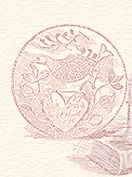Ihr liewe Leit,
Heit mache mer weider middem Hark seim Gedicht "Der Schpode Schulbu."
(Em Tschaerli sei Mudder waardt fer ihn; er hett schunn lengscht deheem sei
solle.)
Deweil leit der Tscherli im black Rocker Damm, dot schtill,
Am Bodde vum diefe Loch.
Mer sin gange schwimme, ich, aer, un der Bill-
Wann ich draadenk, es greisselt mich noch!-
Uff ee Mol greischt er, --un duh was ich will,
Er sinkt, un versauft mer doch.
Mer hen en uff en Bord gelegt, un so
Gedraage bis ans Haus.
Sei Mudder, die sehnt uns-en Grischt gebt sie; noh
Fallt sie graad um, un iss schtill ass en Maus.
Mer lege en hie-was schunnscht iss zu duh?
Un gehne ruhich noh naus.
Sell waar fer vazich Yaahr. Vorm Haus
Ruft heit noch die Mudder ihr Bu:
"Wu bleibt der Tschaerli? Die Schul iss lengscht aus;
Bei daer Zeit iss er schunnscht immer do."
Hie un zrick geht sie, un rei un raus,
Un weess net was zu duh.
Nau, saag, iss sell warricklich "gewehnlich"? Fer 1900?
Un do iss em Hark sei "Wann der Wind mol iwwer die Schtobble bloosst":
Wann der Wind mol iwwer die Schtobble bloosst
Noh weess mer gewiss iss der Summer verbei.
'S iss en anneres Licht no him Sunneschei-
Un en anneres Gfiehl ass im Hatz uffschtoosst!
Wann die Schwalme owets um der Schannschtee rum
Duhn zaerkle un zwiddre, un die Grixel im Feld,
Un die Kaedididds aa mit ihrem eefeldich Gsschelt
Mache en Zucht-noh secht mer als ebbes: "Nau kumm,
'S iss Zeit ass du dich faddichmachscht; 's Schpotyaahr iss do;
'S neegscht kummt der Winder, mit Schnee un mit Eis,
Hoscht du Arwet zu duh, dann mach dich nau dro,
Hoscht du Arwet zu duh, dann mach dich nau dro,
Eb dei Aagelicht fehlt un dei Haar sin gans weiss."
Dei Blicht recht geduh iss der beschde Droscht,
Wann der Wind mol iwwer die Schtobble bloosst.
Ich deet awwer wedde ass viel meh Lei tem John Birmelin Sei "Der
Haerbschtwind" gelese hen ass em Hark sei Gedicht:
Der Haerbschtwind singt en wunnerbaares Lied,
So wie er hot vor viele dausend Yaahr;
Singt vun der Ros, die heit sich hot verblieht,
Vum Keenichreich, ass lengscht vergesse waar.
Mol singt er freehlich, schpielt im goldne Laab
Un schtreicht dem Kind so lieblich darrich die Haar;
Dem Alder singt er'n Lied vum schtille Graab,
Wie'n leiser Hauch, vum scheene Owetrot,
Vum miede Leib, der ball yergeht zu Schtaab.
Macht's gut,
Der Alt Professer
|
Dear people:
Today we will continue with Hark's poem "The Late Schoolboy." (Charleys's
mother is waiting for him; he should have been home a long time ago.)
Meanwhile, Charley lies in Black Rocker Dam, deathly still.
At the bottom of a deep hole.
We had gone swimming, I, he and Bill-
When I think about it, it still makes me shudder-
Suddenly he shouts, and do what I can,
He sinks, and drowns on me.
We laid him on a board, and so
We carried him to his house.
His mother, she sees us-and she gives a yell; then
She just falls over, and is still as a mouse.
We laid him down-what else were we to do?-
And then quietly go out.
That was forty years ago. In front of the house
The mother still today calls her boy:
Where is Charley? School has been out for the longest time;
By this time he is usually always here.
Back and forth she goes, and in and out,
And knows not what to do.
Now tell me, is that really "the usual"? For 1900? And here is
Hark's "When the Wind Blows over the (corn/wheat) stubbles":
When once the wind blows over the stubbles
Then you know that summer is certainly over.
There's a different light then in the sunshine-
And a different feeling that happens in your heart!
When the swallows in the evening around the chimney
Circle and twitter, and the cricket in the field,
And the katydids with their simple scolding
Make a racket-then one likes to say: "Now come,
It's time that you get ready; fall is here;
Next comes winter, with snow and with ice,
If you have work to do, then start in on it now,
Before your eyesight fails and your hair is all white."
To do your duty correctly is your best consolation,
When the wind once blows over the stubbles.
But I would bet that many more people have read John Birmelin's
"The Autumn Wind" than have read Hark's poem:
The autumn wind sings a wonderful song,
Such as it has for many thousands of years;
Sings of the rose that today stopped blooming,
Of the kingdom that has long been forgotten.
Sometimes it sings happily, plays in the golden foliage
And strokes so lovingly the child,s hair;
To the old it sings a song of the quiet grave,
Like a soft breath, of the beautiful evening glow,
Of the tired body, which soon dissolves to dust.
Take care,
The Old Professor
|













